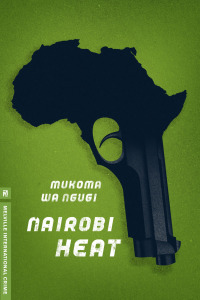Nairobi Heat by Mukoma Wa Ngugi
 Friday, September 23, 2011 at 11:31PM
Friday, September 23, 2011 at 11:31PM 
First published in South Africa in 2009; published by Melville House on September 13, 2011
A black police detective named Ishmael is surprised when a Nairobi taxi driver calls him a white man, but he's as out-of-place in Africa as any other American. Ishmael is chasing clues in the murder of a blonde woman in Madison, Wisconsin's prosperous Maple Bluff neighborhood, where a Kenyan named Joshua Hakizimana claims to have found her dead on his front porch, the apparent victim of a heroin overdose. Hakizimana has achieved some fame as an advocate for Rwandan refugees and doesn't seem the murderous type. On the strength of an anonymous telephone call urging him to come to Nairobi because "the truth is in the past," the police chief rather improbably gives Ishmael permission to pursue the investigation in Kenya. In Nairobi, Ishmael joins a detective named O. As Ishmael and O pursue leads, they become targets of assassination and do a fair amount of their own killing while edging closer to a criminal conspiracy involving corruption and genocide that overshadows the lone death in Madison.
While Nairobi Heat succeeds as a detective story (and quite a good one, once the surprising connection between Hakizimana and the dead woman on his porch is revealed), it is also the story of Ishmael's journey toward an understanding of his racial identity. In addition to finding clues in Kenya, Ishmael finds something else -- not his roots, exactly, but a kind of serenity. The novel explores an interesting racial dynamic: some blacks, including his ex-wife, view Ishmael as a race traitor because he occasionally arrests black suspects, while some whites, seeing his black face in the police department, wonder why he's not in handcuffs. In Kenya, O discusses at some length the relationship between color and justice. Mukoma Wa Ngugi integrates this commentary into the story without slowing the novel's pace and, for the most part, without becoming too preachy (although some degree of preachiness is consistent with the personalities of Ishmael and O).
On the other hand, once Ishmael returns to Madison, the story begins to drag. Ngugi is more sure-footed as he relates the sights and sounds of Nairobi. His prose flows with the rhythm of the streets as he describes dancers and drinkers, taxis and slums, destitute refugees and wealthy landowners. His take on America is less insightful. When Ishmael investigates the murder and its implications after leaving Nairobi, Ngugi adds a twist to the plot that slows the story's momentum without returning a compensatory reward. The KKK plays a role in the novel's ending that is entirely unconvincing, in part because the Klan doesn't have the kind of power or presence in Madison that Ngugi attributes to it. A final discussion of race and class is a bit heavy-handed.
On balance, Nairobi Heat isn't perfect, but it's a quick and easy read that addresses serious issues while telling an entertaining, offbeat detective story. An element of vigilantism that might be disturbing in other novels seems natural in this one. Ishmael is an interesting character and the ending sets up the possibility of his return. On the strength of this novel, I would probably read the next one if Ngugi decides to reprise the character.
RECOMMENDED
Reader Comments